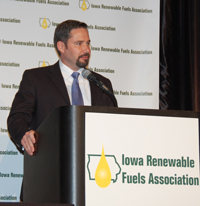The ethanol industry has an unlikely ally in its opposition to the California Low Carbon Fuel Standard that bans the use of corn ethanol in that state. A diverse multi-state coalition that is primarily concerned with the rule’s impact on oil and gas is also opposed.
 The Consumer Energy Alliance, a coalition of over 170 energy consumer groups and 300,000 individual members across the United States, is one of the plaintiffs opposing the California LCFS, which was just ruled unconstitutional by a district court judge.
The Consumer Energy Alliance, a coalition of over 170 energy consumer groups and 300,000 individual members across the United States, is one of the plaintiffs opposing the California LCFS, which was just ruled unconstitutional by a district court judge.
“Not only is an LCFS unconstitutional, but it would also hurt the California economy, farmers, consumers and truckers by raising fuel prices sharply and burdening consumers,” said CEA Executive Vice President Michael Whatley. “And ironically, the policy will have the opposite of its intended effect by creating more greenhouse gases in the long run.”
The CEA’s main concern about the California LCFS is the potential for it to be used to prevent certain sources of petroleum from being converted into fuels such as gasoline, diesel fuel, kerosene and heating oil and that it could adopted nationwide, resulting in lost jobs and declining household revenue.
After the district court judge this week rejected a motion by the state to continue implementing the LCFS despite his ruling that it was unconstitutional, the California Air Resources Board (CARB) decided to appeal to a new court in the 9th Circuit in hopes of a different outcome.
“The decision by CARB to appeal the decision by the District Court is disappointing, but unfortunately not surprising. We look forward to a decision by the Ninth Circuit upholding the District Court and confirming the unconstitutional nature of California’s low carbon fuel standard,” said Whatley, urging CARB to “scrap this faulty program” instead of appealing the decision.
 The 6th Annual Iowa Renewable Fuels Summit this week was another great one, according to Iowa Renewable Fuels Association president Brad Albin, who is VP of manufacturing for Renewable Energy Group (REG).
The 6th Annual Iowa Renewable Fuels Summit this week was another great one, according to Iowa Renewable Fuels Association president Brad Albin, who is VP of manufacturing for Renewable Energy Group (REG).




 The commitment was made to
The commitment was made to  “We have an immediate challenge before us,” NBB CEO Joe Jobe said of the postponed decision regarding 2013 volumes for biomass-based diesel under the RFS2. “The EPA recommended that we raise those volumes from the statutory minimum of a billion gallons to 1.28 billion gallons.” The Office of Management and Budget has to approve that recommendation and Jobe says that decision will be made within the next 45-60 days.
“We have an immediate challenge before us,” NBB CEO Joe Jobe said of the postponed decision regarding 2013 volumes for biomass-based diesel under the RFS2. “The EPA recommended that we raise those volumes from the statutory minimum of a billion gallons to 1.28 billion gallons.” The Office of Management and Budget has to approve that recommendation and Jobe says that decision will be made within the next 45-60 days.  At the
At the  Reaction to President Obama’s
Reaction to President Obama’s  President Obama put a face on the wind energy industry during his
President Obama put a face on the wind energy industry during his  The
The  Luft, who is executive director of the
Luft, who is executive director of the